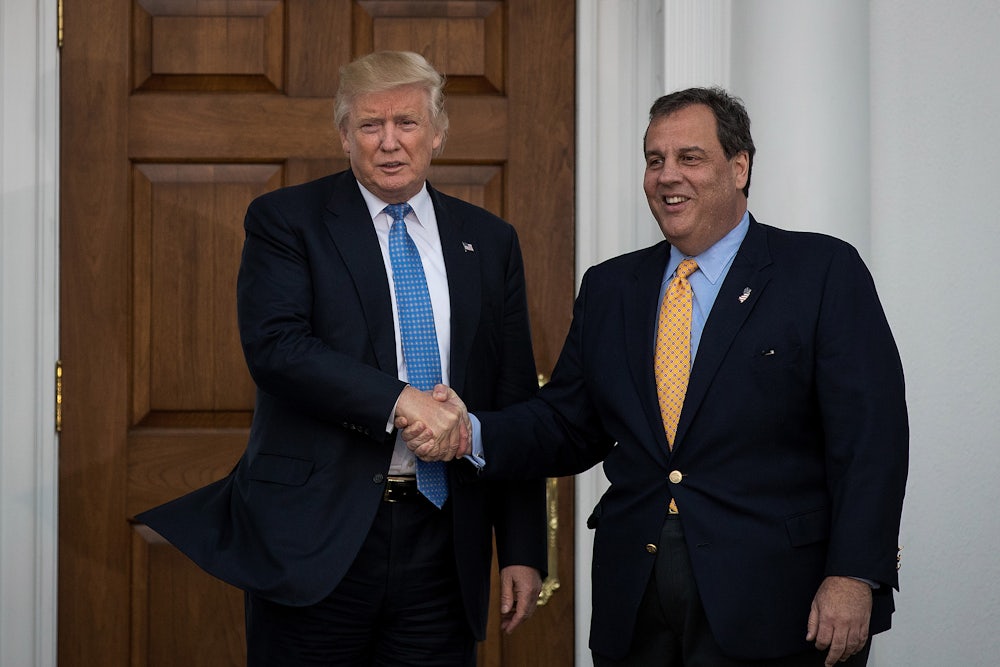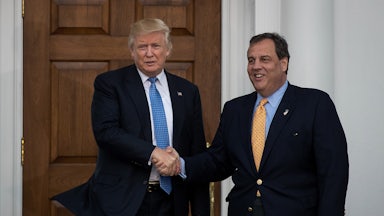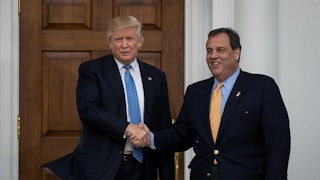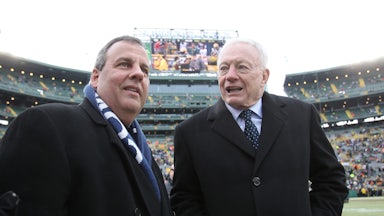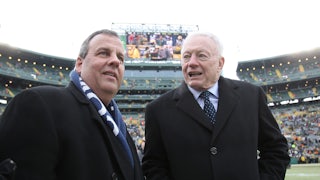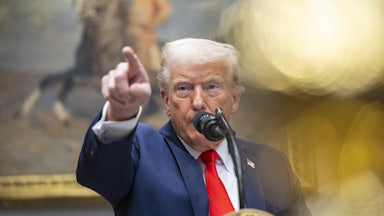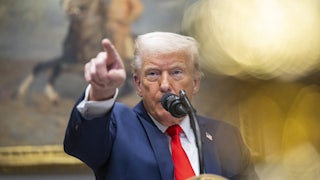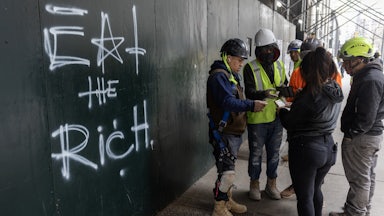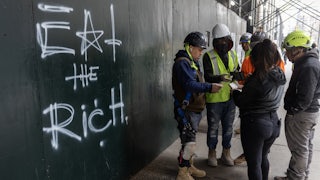Chris Christie thinks he knows the secret to defeating Donald Trump. Speaking in New Hampshire on Monday, the former New Jersey governor made his best case that all it takes to bring the former president to his knees in primary combat is to be just as big a jerk as he is. Boom: It’s all straightforward from here.
But if you have the patience for a little elaboration, Christie has some. A presidential candidate will need to do to Trump “what I did to Marco,” he said, referring to his total humiliation of the Florida senator in a February 2016 GOP primary debate. Presidential primary debate completists might recall the scene of Christie bullying flopsweat-flecked Rubio into robotically repeating the same talking point over and over again.
Chris Christie ruins Marco Rubio’s presidential campaign on live TV. (2016) pic.twitter.com/Il9HeIQWt0
— crazy ass moments in american politics (@ampol_moment) July 28, 2022
“That’s the only thing that’s going to defeat Trump,” Christie said, of a thing he did to Marco Rubio, who outlasted Christie in that same primary. “You have to be fearless, because he will come back—and right at you,” Christie continued. “And that means you need to think about who’s got the skill to do that, and who’s got the guts to do that, because it’s not going to end nicely.”
Christie had come to New Hampshire in part because he wanted to draw attention to the big highlight of his otherwise unremarkable presidential campaign, which also occurred in the Granite State. It’s a weird thing to remember so fondly: Christie’s campaign largely never got anywhere, thanks partly to the fact that his governorship had descended into a plethora of scandals, including one that sent a close aide to prison.
But a big reason Christie flopped in 2020 was because of Donald Trump. In 2016, Trump basically stole the New Jersey governor’s entire brand (the brand is “big jerk who says what he thinks”). Christie briefly summoned his old mojo during his debate exchange with Rubio. He’s probably correct that that one big moment of rhetorical derring-do sunk Rubio’s presidential campaign. Prior to the debate, Rubio was rising in the polls and widely seen as the candidate most likely to win over the anti-Trump and establishment votes. After the debate, his campaign cratered; a month later, he was out of the race completely after a string of disappointing results. (Christie, meanwhile, dropped out immediately after getting walloped in the New Hampshire primary.)
Christie’s theory of the case isn’t entirely uncompelling. In 2016, Trump received the kid-glove treatment from his rivals for months—Rubio, Ted Cruz, and Jeb Bush were terrified of alienating Trump’s rabidly loyal base; each worried that pissing off Trump would mean that the real estate mogul would offer the nominee scant support or encourage his supporters to stay home (if not run as a third-party spoiler against the GOP standard-bearer). This is, to be fair, undoubtedly what would have happened if Trump had lost the primary.
By the time it became clear that Trump had emerged as the front-runner and the likeliest to win the nomination, it was too late. Cruz—who had previously been so deferential to Trump that he basically shrugged off social media posts insulting his wife’s appearance that were promoted by his rival—and Rubio belatedly pounced but discovered soon enough that they had already fallen too far behind. Their jibes, moreover, couldn’t compete. Trump is a fraud in nearly every way that counts, but his political authenticity rests in his willingness to say things others won’t; Rubio tried to copy this by suggesting that Trump had a small penis, but his limp attempt at going vulgar only brought backlash. Someone trained in the normal, weaselly art of political insults—passive aggression, insinuation, plausible deniability—will always look phony next to a guy who will say anything.
There are a couple of problems with Christie’s theory, however—the biggest one being that Christie, there on the debate stage with Trump, chose to not take that route. Not only that, Christie’s first move after quitting the race was to endorse Trump. His obsequiousness peaked when he went on to briefly lead Trump’s transition team after the election. Why didn’t Christie follow his own advice? Because Donald Trump is a very popular politician in the Republican Party and continued relevance within that party requires deference to him.
This points to the big problem with Christie’s theory. People who run for president do so because they want to end up in the Oval Office. Peeling off some portion of Trump’s diehards might swing the primary; going after the former president in the manner Christie describes would likely be a suicide mission. Going scorched earth against Trump might damage him, but it may alienate too many of the Trump supporters needed for a viable candidacy.
Trump’s nicknames have always been overvalued by pundits, but they point to his greatest political asset: the will to go places and say things that other politicians will not, and do so without coming off as a try-hard. These abilities make him unlike most other politicians. Being off-the-cuff and willing at all times to say crazy things is hard to do. Trump’s rivals are all beginners in the field, while Trump is increasingly unhinged and incoherent, but he still retains some of his old charisma.
There is no candidate in the current Republican field with a proven ability to go toe-to-toe with Trump; naturally, none are making much of an effort to do so. In all likelihood, they’ll channel their pugilistic instincts in the same direction Christie did in 2016: They’ll attack Trump’s rivals in the hope of ingratiating themselves with his base. This, famously, also didn’t work, for Christie or any of his fellow 2016 candidates. But at this early juncture in the presidential race, it unfortunately seems like history will repeat itself. Maybe Christie will jump into the race and show us how it’s done. Maybe he’ll land a blow or two this year. But this is Chris Christie, folks! He’s not going to win the Republican nomination in 2024 because he doesn’t have the one thing you actually need to beat Trump: ideas that might prove to be competitive and persuasive to Trump’s own. This might be the reason none of Trump’s competitors best him, again.
